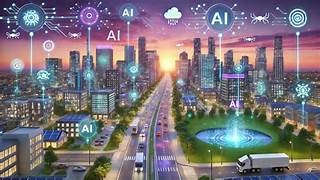
Smartphones: The New Essential Tool for Everyday Survival
Smartphones have evolved from a luxury item to an essential tool in everyday life. They provide more than just communication; they handle tasks such as online banking, entertainment, scheduling, and work. With the integration of GPS, health apps, and security features, smartphones have become indispensable for personal safety and productivity. However, their overuse can lead to negative consequences like digital addiction and mental health concerns. Despite these risks, smartphones continue to b
✨ Raghav Jain

Introduction
Smartphones have evolved from being mere communication devices to becoming indispensable tools for navigating daily life. What was once a luxury has now transformed into a necessity, helping us manage almost every aspect of our existence. From staying connected with others to managing finances, health, and even work, smartphones are the Swiss Army knives of the modern age.
In this article, we will explore how smartphones have become a lifeline, their evolution, the many ways they aid in our daily survival, and why it’s hard to imagine life without them. In today’s world, smartphones have become an indispensable part of daily life, acting as the modern-day Swiss Army knife that helps us manage virtually every aspect of our existence. Once considered a luxury or a symbol of status, these handheld devices have transformed into essential tools for survival, offering a multitude of functions that extend far beyond communication. The smartphone has evolved from a simple device for making calls and sending text messages to a multifaceted powerhouse that caters to nearly every need we have, from entertainment to work, health, social interaction, and even education. They are no longer just about connecting with others; they serve as our personal assistants, planners, entertainment hubs, navigation systems, and so much more. The convenience they offer is unparalleled. Gone are the days of carrying around separate gadgets for listening to music, taking photos, navigating through new cities, or checking the news. All of this and much more can now be accessed with just a few taps on a smartphone screen. The rise of the smartphone has fundamentally changed how we communicate, work, and live, blurring the lines between the physical and digital worlds. One of the most remarkable features of smartphones is their ability to connect us to the world in real-time. Whether it’s through social media platforms, instant messaging apps, or video calls, we can stay in touch with family, friends, and colleagues across the globe. This connectivity has made the world smaller, allowing for instant updates on events, trends, and personal milestones. The ease with which we can share our lives, express ourselves, and engage with others has redefined social interaction. But it’s not just about keeping in touch with others—it’s about personal productivity. Smartphones have become central to managing our professional and personal lives. With a wide range of apps for scheduling, task management, note-taking, and even video conferencing, smartphones have enabled people to work more efficiently and remotely, even in times of crisis or when they’re on the go. The importance of smartphones for work has only increased with the rise of flexible working arrangements, remote work, and digital collaboration tools. Smartphones have also revolutionized how we navigate the world around us. The built-in GPS, combined with mapping apps like Google Maps, means we no longer need to rely on paper maps or ask for directions when traveling. Whether we’re commuting to work, exploring a new city, or simply running errands, the smartphone’s navigation feature makes getting from point A to point B faster and easier. Furthermore, smartphones have transformed the way we consume and interact with media. With streaming services for music, TV shows, movies, and podcasts, smartphones allow us to be entertained anytime, anywhere. Gone are the days when we had to wait for a specific time to catch our favorite TV show or sit in front of a bulky television set. We can watch a movie on a train ride, listen to a podcast while cooking, or catch up on the news during our lunch break. This on-demand media consumption has changed the way we experience entertainment and stay informed. In addition to entertainment, smartphones have become essential tools for managing our health and well-being. With the growing popularity of fitness apps, wearables, and health tracking features, smartphones have evolved into our personal health assistants. They monitor our daily steps, track our workouts, provide insights into our sleep patterns, and even remind us to drink water or take medication. The integration of health-focused apps has empowered people to take charge of their fitness and health goals in a way that was never possible before. Furthermore, smartphones play a critical role in safety and emergency preparedness. With built-in emergency services, location tracking, and the ability to quickly alert loved ones or authorities in times of need, smartphones have become life-saving tools. Whether it’s calling for help during an emergency, sending our location to a friend for safety, or using the flashlight during a power outage, the smartphone has become a crucial tool in moments of danger or uncertainty. Smartphones have also become an important tool for education and learning. With access to an endless array of educational apps, e-books, online courses, and educational videos, smartphones have democratized learning. People can now learn new skills, pursue academic goals, or engage in personal development, all from the convenience of their phones. The ability to access a wealth of knowledge at the touch of a button has made education more accessible to people of all ages and backgrounds. This shift has also sparked the rise of mobile learning platforms, which offer courses in a wide range of subjects, from language learning to programming and digital marketing. The ability to study at your own pace, from anywhere, has opened up new possibilities for lifelong learning. Another notable feature of smartphones is their role in personal finance management. With banking apps, budgeting tools, and payment systems like Apple Pay and Google Pay, smartphones have revolutionized the way we handle money. We can transfer funds, track our spending, invest, and even make purchases without the need for physical cash or credit cards. This ease of financial management has made smartphones central to our daily transactions, simplifying complex financial tasks and making them more accessible to a broader audience. With the increasing importance of online shopping, smartphones have also become essential for e-commerce. Whether we’re browsing for products, comparing prices, reading reviews, or making purchases, smartphones have made shopping a more personalized and convenient experience. E-commerce platforms have optimized their websites and apps for mobile users, making it easier than ever to shop from the comfort of our homes or while on the go. This has transformed the way we shop, allowing us to find exactly what we’re looking for in seconds. The smartphone’s influence on our daily lives also extends to personal organization and time management. With calendars, to-do lists, alarms, and reminders, smartphones help us stay on top of our schedules and commitments. The integration of cloud storage and file-sharing services further enhances productivity, making it easy to access important documents and files from anywhere. This level of accessibility has made smartphones crucial for both personal and professional organization, helping people stay productive and focused throughout the day. However, as much as smartphones offer convenience, there are also challenges and concerns associated with their widespread use. The constant connectivity can lead to information overload, distractions, and the blurring of boundaries between work and personal life. The addiction to smartphones, particularly social media, has become a growing issue, with many individuals struggling to disconnect and maintain a healthy balance between the digital and physical worlds. The overuse of smartphones has also been linked to mental health issues, such as anxiety, depression, and sleep disturbances. Additionally, the rise of smartphone addiction has led to concerns about the impact of screen time on cognitive development, particularly among children and young adults. Despite these challenges, it’s clear that smartphones have become essential tools for modern survival. They have revolutionized the way we communicate, work, travel, entertain ourselves, stay healthy, learn, and manage our finances. They have connected us to a global network, giving us access to information, services, and opportunities that were once unimaginable. While there are valid concerns about their impact on our mental and physical well-being, the overall influence of smartphones on society cannot be ignored. They have become more than just gadgets—they are tools for survival in the digital age, enabling us to navigate the complexities of modern life with ease and efficiency. In the years to come, as technology continues to evolve, smartphones are likely to become even more integrated into our lives, further enhancing their role as essential survival tools.
The Evolution of Smartphones: A Shift from Luxury to Lifeline
When the first mobile phones were introduced, they were primarily used for calling and texting. They were bulky, expensive, and relatively basic. But with the advent of the smartphone in the late 2000s, everything changed.
Key Milestones in the Smartphone Revolution
- 1990s – Mobile phones with basic calling and texting features
- 2000s – Introduction of the smartphone, featuring internet access, cameras, and apps
- 2010s – Smartphones become faster, smarter, and more integrated into daily life
- 2020s – The rise of foldable phones, 5G technology, and AI-powered features
Today, smartphones have become essential for everything from checking emails to navigating traffic to managing personal health.
Communication: Connecting the World in an Instant
The primary function of smartphones was initially communication—and this remains one of its most important features. But the way we communicate has evolved drastically.
Modern Communication Features
- Instant messaging apps like WhatsApp, Telegram, and Signal
- Video calls via Zoom, Skype, or FaceTime
- Social media platforms for staying in touch with friends, family, and followers
These features allow us to maintain relationships, collaborate remotely, and share important moments in real-time, all from the palm of our hands.
Benefits
- Facilitates instant, global communication
- Bridges the gap between long distances
- Enables virtual collaboration for personal and professional use
Productivity and Work: A Mobile Office in Your Pocket
Smartphones have revolutionized the way we work. From remote meetings to cloud storage, they’ve made working from anywhere possible.
Smartphone Tools for Productivity
- Email and calendar apps for work-related tasks
- Document editing and collaboration tools like Google Docs and Microsoft Office
- Project management apps like Trello, Asana, and Slack
With smartphones, staying productive has never been easier—whether you’re on the go, at home, or at the office.
Benefits
- Enables remote work and collaboration
- Streamlines task management and communication
- Enhances work-life balance by keeping work tasks organized and accessible
Entertainment and Leisure: A World of Fun at Your Fingertips
Beyond work, smartphones offer endless entertainment and leisure options that keep us connected to the world of media.
Entertainment Features
- Streaming services like Netflix, YouTube, and Spotify
- Gaming apps for on-the-go entertainment
- E-books and audiobooks for reading enthusiasts
Whether you’re unwinding after a long day or looking to kill time, smartphones provide an all-in-one entertainment hub.
Benefits
- Access to a wide variety of media content
- On-demand entertainment anytime, anywhere
- Personalized experiences based on preferences and recommendations
Health and Wellness: Tracking and Managing Well-being
Smartphones are no longer just for communication—they’ve become critical tools for health and wellness, offering a variety of apps and features designed to support our physical and mental health.
Health and Wellness Features
- Fitness tracking apps that monitor steps, workouts, and calories burned
- Sleep apps that help track rest patterns and improve sleep quality
- Mental health apps offering guided meditations, therapy, and mindfulness exercises
These features provide users with the tools needed to track their well-being, stay active, and improve their mental health.
Benefits
- Encourages a healthy, active lifestyle
- Helps track fitness goals and progress
- Provides mental health support and stress relief
Navigation: The GPS Revolution
Gone are the days of using paper maps or asking for directions. Smartphones have made navigation incredibly convenient and efficient.
Navigation Tools
- Google Maps for real-time traffic updates and directions
- Ride-sharing apps like Uber and Lyft for seamless transportation
- Public transport apps that provide schedules and route information
Smartphones provide real-time updates, making traveling easier and more efficient than ever before.
Benefits
- Ensures accurate, real-time navigation
- Offers convenience for transportation planning
- Helps save time and reduce stress during travel
Financial Management: Your Mobile Wallet and Bank
Smartphones have revolutionized the way we manage our finances, offering secure and convenient ways to send money, track expenses, and even invest.
Financial Tools on Smartphones
- Mobile banking apps for easy access to account information and transactions
- Payment apps like Paytm, Google Pay, and Apple Pay for quick payments
- Investment apps like Robinhood and Zerodha for managing investments
Smartphones have made it easier to handle financial tasks without needing to visit a bank or carry cash.
Benefits
- Convenient and secure way to manage finances
- Enables contactless payments for ease and speed
- Provides tools for financial planning and investment tracking
Shopping and Lifestyle: A Digital Marketplace
Smartphones have made shopping more convenient by turning it into a digital experience.
Shopping Features
- E-commerce apps like Amazon, Flipkart, and Nykaa for online shopping
- Food delivery apps like Swiggy and Zomato for convenience at home
- Retail apps offering loyalty programs and personalized discounts
Smartphones allow you to browse, shop, and make purchases from the comfort of your home or on the go.
Benefits
- Offers convenience and accessibility to a wide range of products
- Personalized shopping experience with recommendations
- Saves time and money with instant deals and offers
Security: Protecting Data and Privacy
With all the data stored on smartphones, security has become a top priority. Modern smartphones come equipped with advanced features to safeguard personal information.
Security Features
- Fingerprint recognition and facial recognition for secure unlocking
- Encryption for protecting sensitive data
- Two-factor authentication to enhance account security
Smartphones play a vital role in safeguarding personal and financial information, making security a key priority in our digital lives.
Benefits
- Provides advanced security features to protect data
- Enhances privacy with encryption and secure logins
- Reduces the risk of identity theft and fraud
The Emotional Impact: A Double-Edged Sword
While smartphones provide countless benefits, they also come with challenges such as screen addiction, privacy concerns, and reduced face-to-face interactions.
Addressing the Challenges
- Practice digital detoxes to limit screen time
- Set screen-time limits for better mental health
- Encourage offline connections to strengthen real-world relationships
Balance is essential in making smartphones a tool for better living rather than a source of stress or isolation.
Conclusion
Smartphones have evolved from luxury gadgets to essential tools that support nearly every aspect of modern life. They have redefined communication, productivity, entertainment, health, and much more. With the power to connect us, manage our day-to-day tasks, and provide essential services, smartphones have truly become the new lifeline for survival in the digital age.
However, as with any powerful tool, it’s important to use smartphones mindfully and ensure that they enhance rather than dominate our lives. By finding a healthy balance, we can continue to enjoy the convenience and benefits they offer while avoiding the pitfalls of over-dependence.
Q&A Section
1. How have smartphones transformed from being a luxury to an essential tool?
Ans:- Initially, smartphones were seen as a luxury for the wealthy and tech-savvy. Over time, their affordability and multifunctionality have made them indispensable. From making calls to handling banking, shopping, and entertainment, smartphones are now central to daily life.
2. Why are smartphones considered essential in modern-day life?
Ans:- Smartphones offer a range of functions beyond just communication. They provide access to the internet, social media, online banking, GPS, health apps, and work tools, making them vital for staying connected, organized, and productive.
3. How do smartphones impact our communication?
Ans:- Smartphones have revolutionized communication by enabling instant messaging, video calls, emails, and social media updates. They allow for real-time connections with family, friends, and colleagues, regardless of geographical distance.
4. What role do smartphones play in managing daily tasks and schedules?
Ans:- Smartphones help manage schedules, set reminders, track tasks, and integrate calendars. Apps like note-taking, task management, and alarms help keep our routines organized and efficient, ensuring we never miss important tasks or appointments.
5. How have smartphones changed the way we work?
Ans:- With mobile productivity apps and email access, smartphones allow for remote work, flexibility, and collaboration. They support video conferences, document editing, and project management, making them crucial for work on the go.
6. In what ways do smartphones enhance personal security and safety?
Ans:- Smartphones have become essential for personal safety with features like location tracking, emergency contacts, and safety apps. GPS, for example, helps people find their way in unfamiliar places, while alert systems keep users informed in emergencies.
7. How do smartphones contribute to entertainment and leisure?
Ans:- Smartphones provide instant access to music, movies, games, books, and social media platforms. They allow entertainment on the go, whether commuting, traveling, or relaxing at home, offering endless options for leisure.
8. What impact have smartphones had on education and learning?
Ans:- Smartphones have become powerful learning tools by offering access to online courses, educational apps, research tools, and e-books. They allow for on-demand learning, breaking geographical barriers, and making education more accessible.
9. How do smartphones help in maintaining health and well-being?
Ans:- Smartphones help track physical activity, monitor sleep patterns, and maintain health records. Apps for meditation, fitness, and diet management contribute to overall well-being, promoting healthier lifestyles and wellness goals.
10. What are the risks associated with excessive smartphone use?
Ans:- Overusing smartphones can lead to issues like digital addiction, decreased attention span, disrupted sleep, and mental health concerns such as anxiety and depression. It’s essential to balance smartphone use and take breaks from screens.
Similar Articles
Find more relatable content in similar Articles

AI-Powered Hackers: The New Cy..
In 2025, cyber threats have en.. Read More

AI in Drug Discovery: Faster C..
Artificial Intelligence is rev.. Read More

Solar-Powered Wearables: Can T..
Solar-powered wearables are re.. Read More

Smart Cities: How Technology I..
Smart cities are transforming .. Read More
Explore Other Categories
Explore many different categories of articles ranging from Gadgets to Security
Smart Devices, Gear & Innovations
Discover in-depth reviews, hands-on experiences, and expert insights on the newest gadgets—from smartphones to smartwatches, headphones, wearables, and everything in between. Stay ahead with the latest in tech gear
Apps That Power Your World
Explore essential mobile and desktop applications across all platforms. From productivity boosters to creative tools, we cover updates, recommendations, and how-tos to make your digital life easier and more efficient.
Tomorrow's Technology, Today's Insights
Dive into the world of emerging technologies, AI breakthroughs, space tech, robotics, and innovations shaping the future. Stay informed on what's next in the evolution of science and technology.
Protecting You in a Digital Age
Learn how to secure your data, protect your privacy, and understand the latest in online threats. We break down complex cybersecurity topics into practical advice for everyday users and professionals alike.
© 2025 Copyrights by rTechnology. All Rights Reserved.